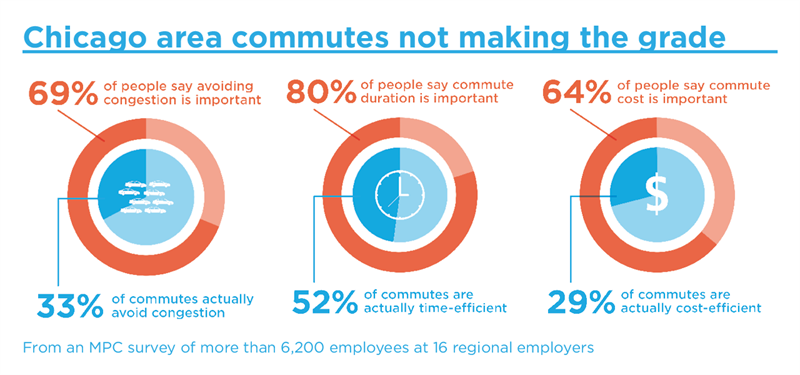Issue
The Metropolitan Planning Council's Moving at the Speed of Congestion study found traffic congestion costs the Chicago region $7.3 billion annually in lost time, fuel and environmental damage. For commuters, sitting in traffic diminishes productivity, increases stress levels and lowers overall quality of life. For employers, congestion decreases employee satisfaction and retention, and increases parking and health care costs.
MPC surveyed more than 6,200 employees at 16 companies around the region, from small to large, both city and suburban. The results were clear: Although employees hope their commutes would avoid congestion and be time- and cost-efficient, the reality falls far short.

Solutions
The Chicago region is rich in transportation options, from traditional public transit networks to newer modes like car sharing and bike sharing. Although we continue to invest in rebuilding and expanding our transportation system, we cannot build our way out of congestion. We must make the most efficient use of our existing network: We need transportation demand management (TDM).
Of the 10 largest metro areas in the United States, Chicago is the only one without a formal transportation demand management organization.
TDM can be thought of as a marketing campaign for all the region’s transportation options: It promotes alternatives to driving alone, such as transit use and ridesharing. It provides coordinated information and services for travelers, eliminating information gaps that might otherwise be a barrier. Tax benefits and other financial incentives can sweeten the deal for both commuters and employers. Effective TDM reduces congestion and delays and improves regional mobility and air quality. It reduces expenses for commuters and lowers the cost of doing business, strengthening the regional economy.

To evaluate the need for and prove the efficacy of TDM in Chicago, MPC conducted the Commute Options pilot, which engaged more than 6,200 employees at 16 companies around the region. The pilot confirmed that area commuters were frustrated, but often unaware of all the options available to them. The pilot also identified a number of relatively minor barriers that were discouraging employees from trying alternate commutes. A regional TDM strategy would take the efforts and lessons from MPC’s pilot and institutionalize them.
MPC's report, Chicago Demands Transportation Management, details the lessons learned during the Commute Options pilot, and explains MPC's recommended strategy for implementing a formal TDM in the region. Download the report now.
Benefits
Effective transportation demand management provides benefits to the region far beyond the obvious reduction in traffic congestion. Workers will spend less time and money on their commute, leaving more money in their pockets with more free time to spend it. Employers that offer TDM benefits will better attract and retain skilled workers, who will arrive at work less stressed following a less straining commute. Even regional health will benefit as commuters walk and bike more while reduced automobile congestion improves air quality.